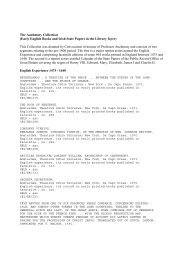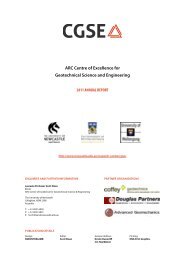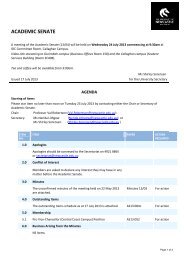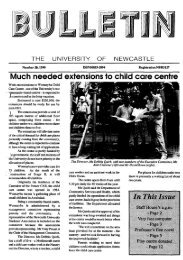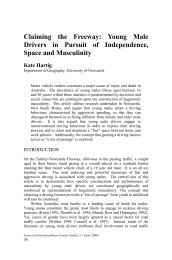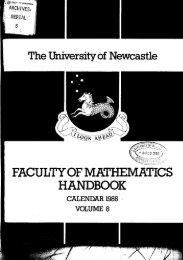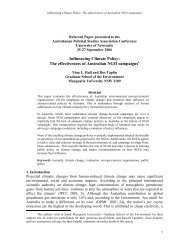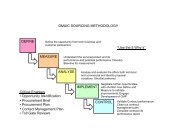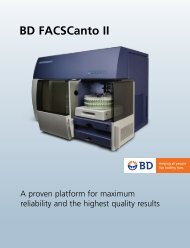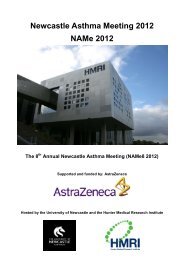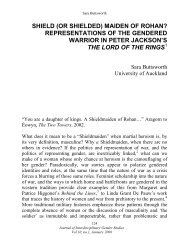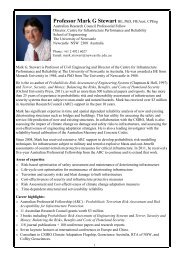Faculty of Mathematic Handbook,1987 - University of Newcastle
Faculty of Mathematic Handbook,1987 - University of Newcastle
Faculty of Mathematic Handbook,1987 - University of Newcastle
You also want an ePaper? Increase the reach of your titles
YUMPU automatically turns print PDFs into web optimized ePapers that Google loves.
680118 S<strong>of</strong>tware-Oriented Computer Architecture - J.L. Keedy<br />
Prerequisite<br />
Hours<br />
Examination<br />
Content<br />
Computer Operating Systems<br />
2 lecture hours per week (one semester)<br />
plus regular assignments (including essay)<br />
One 2-hour paper<br />
Conventional computer architectures have usually been designed with little understanding<br />
<strong>of</strong> the needs <strong>of</strong> the s<strong>of</strong>tware intended to be ex.ecuted on them. This topic examines<br />
mechanisms which can fairly easily be incorporated into computers and which can have a<br />
dramatic effect on the design <strong>of</strong> s<strong>of</strong>tware (operating systems, compilers and application<br />
programs). The main issues discussed include stack organisation, the structure <strong>of</strong> virtual<br />
memory, addressing mechanisms and protection, as well as support for modularity.<br />
680101 Advanced Operating System Principles - J.L. Keedy<br />
Prerequisite<br />
Computer Operating Systems<br />
Hours<br />
2 lecture hours per week (one semester)<br />
plus regular assignments<br />
Examination<br />
Content<br />
One 2-hour paper<br />
A critical study <strong>of</strong> operating system techniques, with emphasis on the nature <strong>of</strong> processes<br />
and the methods used to synchronise them, including a study <strong>of</strong> various advanced<br />
mechanisms. Other aspects studied may include modularity, naming, file system<br />
structures and command language design. Various new ideas for structuring operating<br />
systems are presented.<br />
680113 Formal Semantics <strong>of</strong> Programming Languages - Simon<br />
Prerequisite<br />
Programming Languages & Systems<br />
Hours<br />
2 lecture hours per week (one semester)<br />
Examination<br />
One 2-hour paper<br />
Content<br />
The syntax <strong>of</strong> programming languages is generally described quite concisely and<br />
unambiguously in syntax diagrams, BNF or the like; but the semantics, the meaning or<br />
the outcome <strong>of</strong> constructs in the language, is generally described quite sloppily in<br />
English. Several highly formal abstract systems have been developed for the semantic<br />
description <strong>of</strong> programming languages. This course will look at such systems in general,<br />
and at one <strong>of</strong> them, denotational semantics, in detail.<br />
Texts<br />
Gordon, M.J.C.<br />
The Denatational Description <strong>of</strong> Programming<br />
Languages (Springer Verlag 1979)<br />
References<br />
Milne & Strachey<br />
A Theory <strong>of</strong> Programming Language Semantics<br />
(Wiley 1976)<br />
Delwtational Semantics: The Scott-Strachey Approach<br />
to Programming Language Theory (MIT Press 1977)<br />
56<br />
680103 Artificial Intelligence - Simon<br />
Prerequisite<br />
Programming Languages & Systems<br />
Hours<br />
2 lecture hours per week (one semester)<br />
Examination<br />
Content<br />
One 2-hour paper<br />
This course will provide an overview <strong>of</strong> Artificial Intelligence, covering some or all <strong>of</strong><br />
the following topics: introduction and history; game playing; representation <strong>of</strong> knowledge;<br />
natural language processing; expert systems; automatic deduction; predicate calculus;<br />
theorem proving; computer vision; computer learning; philosophical, psychological and<br />
social issues.<br />
References<br />
Barr & Feigenbaum<br />
Boden<br />
Winston<br />
Nilsson<br />
The <strong>Handbook</strong> <strong>of</strong> Artijiciallntelligence (pitman 1981)<br />
Artificiallntelligence and Natural Man<br />
(Harvester Press 1977)<br />
ArtijicialIntelligence (Addison-Wesley 1977)<br />
Problem Solving Methods in ArlijicialImelJigence<br />
(McGraw-Hill 1971)<br />
680110 Concurrency, Complexity and VLSI - B. Beresford-Smith<br />
Prerequisite<br />
Theory <strong>of</strong> Computing<br />
Hours<br />
2 lecture hours per week (one semester)<br />
Examination<br />
Content<br />
One 2-hour paper<br />
This course provides an introduction to aspects <strong>of</strong> VLSI systems which are relevant to<br />
those with a s<strong>of</strong>tware bent. The fundamentals <strong>of</strong> VLSI are introduced together with a<br />
description <strong>of</strong> the types <strong>of</strong> s<strong>of</strong>tware design tools used. The opportunities which VLSI<br />
<strong>of</strong>fers for the development <strong>of</strong> non-conventional computational structures and the<br />
theoretical computer models and algorithms appropriate to such structures are<br />
investigated. Complexity and other issues arising from the prospect <strong>of</strong> building machines<br />
with very many parallel processing elements and a high level <strong>of</strong> concurrency are<br />
discussed.<br />
References<br />
Evans, D.J. (ed.)<br />
Hopcr<strong>of</strong>t, lE. & Ullman, J.D.<br />
Kuck, D.l., Lawrie, D.H.<br />
& Sameh, A.H. (eds)<br />
Mead, C.A. & Conway, L.A.<br />
Savage, J.E.<br />
Traub, J.F. (ed)<br />
Ullman, J.D.<br />
Parallel Processing Systems<br />
(Cambridge <strong>University</strong> Press 1982)<br />
Introduction to Automata Theory, Languages and<br />
Computation (Addison-Wesley 1979)<br />
High Speed Computer and Algorithm Organization<br />
(Academic Press 1977)<br />
Introduction to VISl Systems (Addison-Wesley 1980)<br />
The Complexity <strong>of</strong> Computing (Wiley 1976)<br />
Algorithms and Complexity (Academic "Press 1976)<br />
Computational Aspects <strong>of</strong> VLSl<br />
(Computer Science Press 1984)<br />
57



